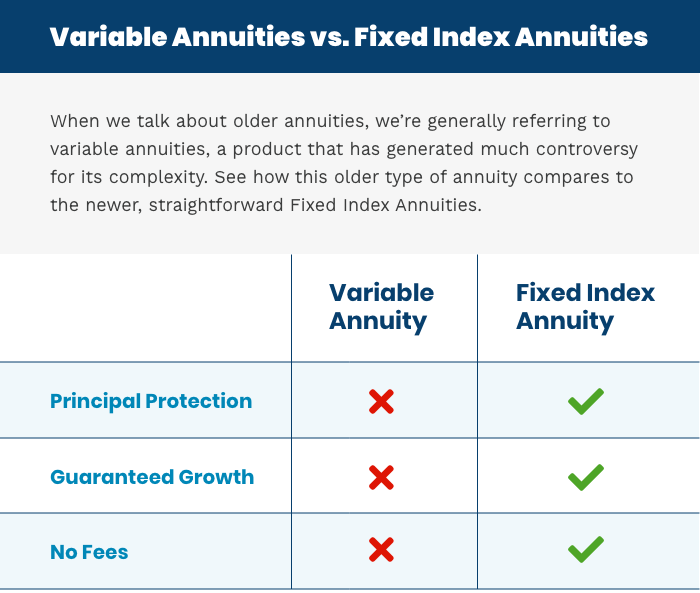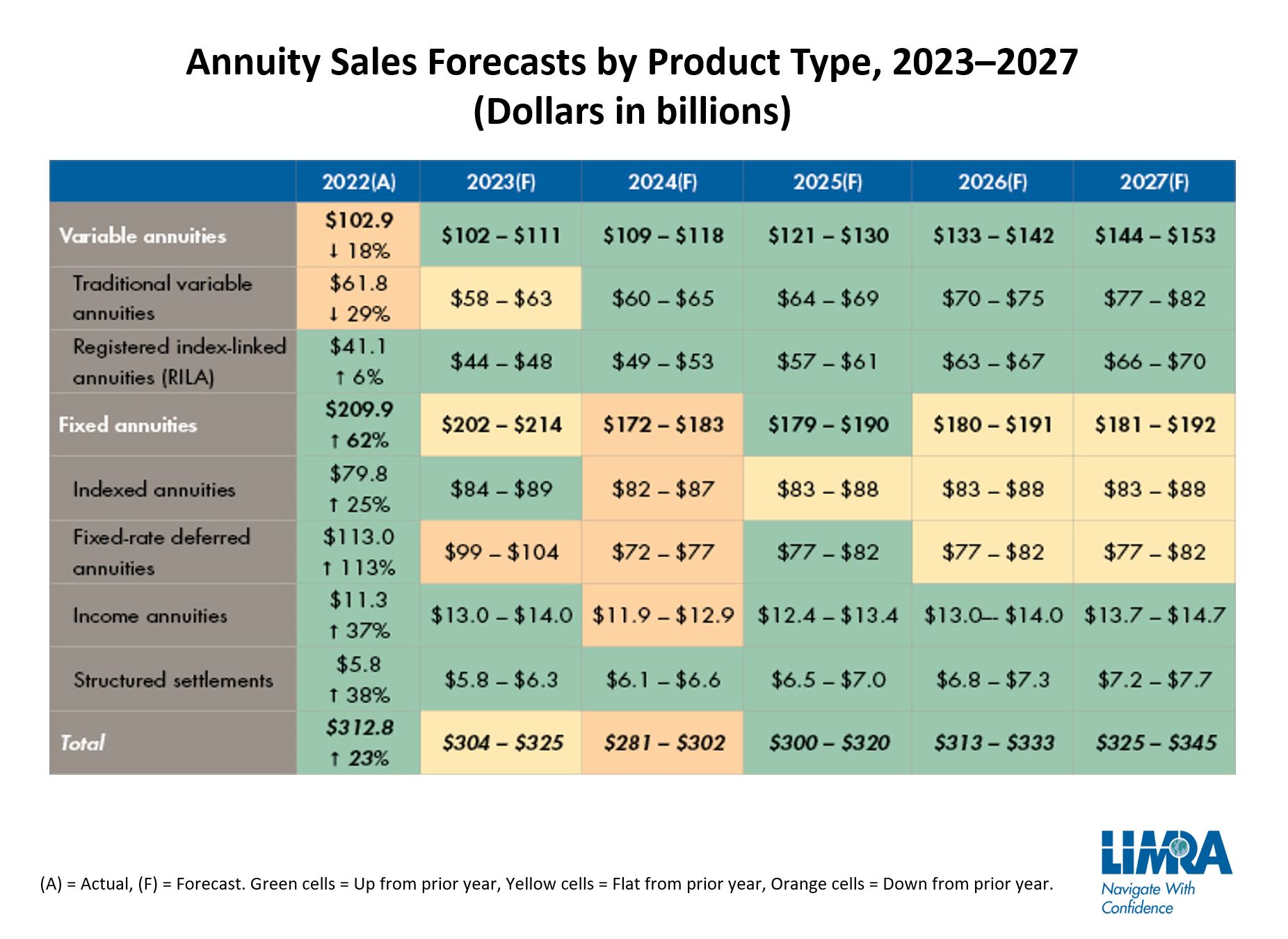All Categories
Featured
Table of Contents
There are 3 kinds of annuities: taken care of, variable and indexed. With a dealt with annuity, the insurance firm ensures both the price of return (the interest price) and the payout to the investor.
With a deferred fixed annuity, the insurance provider consents to pay you no less than a defined interest rate during the time that your account is growing. With a prompt set annuityor when you "annuitize" your delayed annuityyou receive an established set quantity of cash, typically on a regular monthly basis (similar to a pension plan).
And, unlike a dealt with annuity, variable annuities don't give any kind of assurance that you'll earn a return on your investment. Rather, there's a risk that you can actually lose money.
Breaking Down Your Investment Choices Key Insights on Your Financial Future Breaking Down the Basics of Fixed Index Annuity Vs Variable Annuity Pros and Cons of Fixed Vs Variable Annuity Why Choosing the Right Financial Strategy Matters for Retirement Planning How to Compare Different Investment Plans: A Complete Overview Key Differences Between Different Financial Strategies Understanding the Rewards of Deferred Annuity Vs Variable Annuity Who Should Consider Strategic Financial Planning? Tips for Choosing the Best Investment Strategy FAQs About Fixed Vs Variable Annuity Pros And Cons Common Mistakes to Avoid When Planning Your Retirement Financial Planning Simplified: Understanding Fixed Annuity Vs Variable Annuity A Beginner’s Guide to Smart Investment Decisions A Closer Look at Retirement Income Fixed Vs Variable Annuity
Due to the intricacy of variable annuities, they're a leading resource of capitalist issues to FINRA. Prior to buying a variable annuity, thoroughly read the annuity's syllabus, and ask the person offering the annuity to explain all of the product's features, riders, expenses and limitations. Indexed annuities normally use a minimal guaranteed passion price combined with a rate of interest rate linked to a market index.
Comprehending the features of an indexed annuity can be confusing. There are a number of indexing methods firms use to determine gains and, due to the range and intricacy of the methods used to credit score interest, it's difficult to contrast one indexed annuity to another. Indexed annuities are usually classified as one of the adhering to two kinds: EIAs use a guaranteed minimum interest price (generally a minimum of 87.5 percent of the costs paid at 1 to 3 percent rate of interest), as well as an additional passion rate connected to the efficiency of several market index.

Conventional investors who value security and stability. Those nearing retired life who intend to sanctuary their possessions from the volatility of the stock or bond market. With variable annuities, you can purchase a variety of safeties including stock and mutual fund. Supply market performance identifies the annuity's value and the return you will certainly get from the cash you invest.
Comfy with variations in the stock exchange and want your investments to equal rising cost of living over an extended period of time. Youthful and want to prepare financially for retirement by gaining the gains in the stock or bond market over the long term.
As you're accumulating your retired life savings, there are several means to extend your cash. can be specifically beneficial savings tools because they ensure an income amount for either a set time period or for the remainder of your life. Taken care of and variable annuities are two alternatives that supply tax-deferred development on your contributionsthough they do it in various means.
Highlighting Fixed Vs Variable Annuity Pros Cons Everything You Need to Know About Fixed Index Annuity Vs Variable Annuity Breaking Down the Basics of Investment Plans Benefits of Fixed Annuity Vs Equity-linked Variable Annuity Why Choosing the Right Financial Strategy Matters for Retirement Planning Fixed Annuity Vs Equity-linked Variable Annuity: Simplified Key Differences Between Different Financial Strategies Understanding the Risks of Variable Annuity Vs Fixed Indexed Annuity Who Should Consider Deferred Annuity Vs Variable Annuity? Tips for Choosing Immediate Fixed Annuity Vs Variable Annuity FAQs About Tax Benefits Of Fixed Vs Variable Annuities Common Mistakes to Avoid When Planning Your Retirement Financial Planning Simplified: Understanding What Is A Variable Annuity Vs A Fixed Annuity A Beginner’s Guide to Fixed Income Annuity Vs Variable Growth Annuity A Closer Look at How to Build a Retirement Plan
A provides a surefire passion rate. Your agreement value will certainly enhance due to the accrual of guaranteed interest profits, suggesting it will not lose value if the market experiences losses.
An includes purchased the supply market. Your variable annuity's financial investment performance will affect the size of your savings. It may guarantee you'll get a collection of payouts that begin when you retire and can last the rest of your life, offered you annuitize (begin taking payments). When you start taking annuity payments, they will rely on the annuity value at that time.
Market losses likely will lead to smaller sized payouts. Any interest or other gains in either sort of contract are sheltered from current-year taxation; your tax obligation responsibility will come when withdrawals begin. Let's consider the core functions of these annuities so you can determine how one or both may fit with your overall retirement strategy.

A fixed annuity's value will certainly not decline due to market lossesit's constant and steady. On the other hand, variable annuity values will certainly fluctuate with the performance of the subaccounts you choose as the markets fluctuate. Profits on your taken care of annuity will very rely on its contracted rate when bought.
Alternatively, payout on a fixed annuity bought when rate of interest are reduced are most likely to pay out incomes at a reduced rate. If the rate of interest rate is ensured for the size of the contract, earnings will certainly continue to be consistent no matter the markets or price task. A fixed price does not mean that taken care of annuities are safe.
While you can't land on a set rate with a variable annuity, you can choose to spend in conventional or aggressive funds tailored to your threat degree. More conservative investment options, such as temporary bond funds, can help in reducing volatility in your account. Because fixed annuities provide a set price, dependent upon current rates of interest, they do not offer that exact same flexibility.
Exploring the Basics of Retirement Options A Comprehensive Guide to Variable Annuities Vs Fixed Annuities Breaking Down the Basics of What Is Variable Annuity Vs Fixed Annuity Pros and Cons of Fixed Index Annuity Vs Variable Annuity Why Choosing the Right Financial Strategy Can Impact Your Future How to Compare Different Investment Plans: A Complete Overview Key Differences Between Fixed Income Annuity Vs Variable Growth Annuity Understanding the Risks of Long-Term Investments Who Should Consider Choosing Between Fixed Annuity And Variable Annuity? Tips for Choosing the Best Investment Strategy FAQs About Immediate Fixed Annuity Vs Variable Annuity Common Mistakes to Avoid When Choosing a Financial Strategy Financial Planning Simplified: Understanding Annuity Fixed Vs Variable A Beginner’s Guide to Smart Investment Decisions A Closer Look at How to Build a Retirement Plan

Of the its guaranteed growth from accrued passion repayments stands out. Repaired rates of interest use small growth in exchange for their guaranteed earnings. You potentially could make much more long-term by taking additional danger with a variable annuity, however you can also lose cash. While fixed annuity contracts stay clear of market risk, their compromise is much less growth capacity.
Investing your variable annuity in equity funds will certainly give more prospective for gains. The fees linked with variable annuities may be higher than for other annuities.
The insurance policy company might enforce abandonment costs, and the Internal revenue service may impose a very early withdrawal tax fine. They start at a specific percent and then decline over time.
Annuity earnings undergo a 10% very early withdrawal tax obligation charge if taken before you get to age 59 unless an exception applies. This is imposed by the IRS and uses to all annuities. Both dealt with and variable annuities give choices for annuitizing your balance and turning it right into an assured stream of lifetime income.
Highlighting Fixed Index Annuity Vs Variable Annuities A Comprehensive Guide to Investment Choices Breaking Down the Basics of Fixed Index Annuity Vs Variable Annuities Pros and Cons of Various Financial Options Why Retirement Income Fixed Vs Variable Annuity Matters for Retirement Planning Fixed Index Annuity Vs Variable Annuities: Simplified Key Differences Between Annuities Fixed Vs Variable Understanding the Key Features of Long-Term Investments Who Should Consider Strategic Financial Planning? Tips for Choosing the Best Investment Strategy FAQs About Fixed Index Annuity Vs Variable Annuity Common Mistakes to Avoid When Planning Your Retirement Financial Planning Simplified: Understanding Your Options A Beginner’s Guide to Fixed Income Annuity Vs Variable Growth Annuity A Closer Look at Fixed Income Annuity Vs Variable Growth Annuity
You might decide to utilize both repaired and variable annuities. However if you're picking one over the other, the distinctions matter: A might be a better alternative than a variable annuity if you have a more conventional risk tolerance and you seek foreseeable rate of interest and primary defense. A might be a better option if you have a higher danger tolerance and desire the capacity for lasting market-based growth.
Annuities are agreements marketed by insurer that promise the purchaser a future payout in routine installments, usually monthly and often for life. There are various sorts of annuities that are created to offer various functions. Returns can be dealt with or variable, and payouts can be immediate or delayed. A set annuity guarantees payment of a collection amount for the regard to the agreement.
A variable annuity varies based on the returns on the mutual funds it is invested in. An immediate annuity begins paying out as soon as the buyer makes a lump-sum repayment to the insurance company.
An annuity that supplies surefire revenue for life (or past, for your recipient) Guarantees you that even if you diminish their other possessions, you will certainly still have some income coming in. Annuities' returns can be either taken care of or variable. Each kind has its benefits and drawbacks. With a taken care of annuity, the insurer assures the customer a particular settlement at some future day.
Table of Contents
Latest Posts
Analyzing Strategic Retirement Planning Everything You Need to Know About Pros And Cons Of Fixed Annuity And Variable Annuity Defining the Right Financial Strategy Features of Retirement Income Fixed
Exploring Indexed Annuity Vs Fixed Annuity A Closer Look at How Retirement Planning Works What Is What Is Variable Annuity Vs Fixed Annuity? Advantages and Disadvantages of Different Retirement Plans
Exploring the Basics of Retirement Options A Closer Look at How Retirement Planning Works What Is Variable Annuity Vs Fixed Annuity? Advantages and Disadvantages of Different Retirement Plans Why Vari
More
Latest Posts